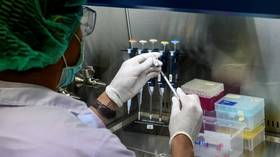Thailand to trial two domestically produced nasal Covid vaccines on humans after successful tests on mice

A government spokesperson has announced that Thailand will launch human clinical trials for two domestically produced nasal coronavirus vaccines by the end of the year following successful tests on mice.
On Wednesday, Ratchada Thanadirek, a deputy government official, shared that the nasal spray Covid shots developed by the National Center for Genetic Engineering and Biotechnology will be tested on people at the end of 2021, as long as Thailand’s food and drug authority gives the green light.
Next March the trial will also test how protective the medicines are against the highly contagious Delta Covid variant now found in almost all corners of the world. If Thailand’s nasal administrative vaccines prove to be effective, the country hopes to produce doses for wider use in mid-2022.
Also on rt.com Pill version of Covid-19 vaccine to start clinical trial in IsraelThe human trials launch comes after the two vaccines produced no negative side effects on lab rodents during testing. One of the two nasal shots also stimulated immunity through the production of antibodies and formation of T-cells.
Thailand’s development of a Covid nasal spray vaccine is a positive scientific advancement, as studies show that the nose is a key entry point for the coronavirus. The Johns Hopkins University School of Medicine found last August that the virus is able to latch onto cells in the upper nasal passageway more easily than other parts of the nose or windpipe.
Also on rt.com Scientists discover ‘grappling hook’ which makes coronavirus so much more infectious than its SARS predecessorOther nations worldwide have been attempting to produce their own nasally administered Covid vaccine. Lancaster University in the UK has trialled its intranasal Covid shot on mice and hamsters, reporting earlier in August positive findings similar to the Thai study.
The Southeast Asian country is set to trial two other domestically made coronavirus jabs this month, with the mRNA ChulaCov19 vaccine, produced by a Thai university, to start its second phase of human trials after tests on monkeys and mice.
Thailand has so far fully vaccinated around 7% of its population, while almost a quarter of its 66 million population have received their first dose.
Like this story? Share it with a friend!













